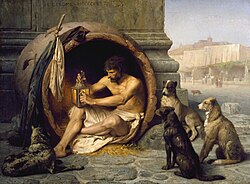Political views

The Right to be Lazy , an essay by Cuban-born French revolutionary Marxist Paul Lafargue, manifests that "When, in our civilized Europe, we would find a trace of the native beauty of man, we must go seek it in the nations where economic prejudices have not yet uprooted the hatred of work ... The Greeks in their era of greatness had only contempt for work: their slaves alone were permitted to labor: the free man knew only exercises for the body and mind ... The philosophers of antiquity taught contempt for work, that degradation of the free man, the poets sang of idleness, that gift from the Gods." [22] And so he says "Proletarians, brutalized by the dogma of work, listen to the voice of these philosophers, which has been concealed from you with jealous care: A citizen who gives his labor for money degrades himself to the rank of slaves." (The last sentence paraphrasing Cicero. [12] )
Raoul Vaneigem, theorist of the post-surrealist Situationist International which was influential in the May 68 events in France, wrote The Book of Pleasures. In it he says that "You reverse the perspective of power by returning to pleasure the energies stolen by work and constraint ... As sure as work kills pleasure, pleasure kills work. If you are not resigned to dying of disgust, then you will be happy enough to rid your life of the odious need to work, to give orders (and obey them), to lose and to win, to keep up appearances, and to judge and be judged." [23]
Autonomist philosopher Bifo defines refusal of work as not "so much the obvious fact that workers do not like to be exploited, but something more. It means that the capitalist restructuring, the technological change, and the general transformation of social institutions are produced by the daily action of withdrawal from exploitation, of rejection of the obligation to produce surplus value, and to increase the value of capital, reducing the value of life." [1] More simply he states "Refusal of work means ... I don't want to go to work because I prefer to sleep. But this laziness is the source of intelligence, of technology, of progress. Autonomy is the self-regulation of the social body in its independence and in its interaction with the disciplinary norm." [1]
As a social development Bifo remembers, [1]
that one of the strong ideas of the movement of autonomy proletarians during the 70s was the idea "precariousness is good". Job precariousness is a form of autonomy from steady regular work, lasting an entire life. In the 1970s many people used to work for a few months, then to go away for a journey, then back to work for a while. This was possible in times of almost full employment and in times of egalitarian culture. This situation allowed people to work in their own interest and not in the interest of capitalists, but quite obviously this could not last forever, and the neoliberal offensive of the 1980s was aimed to reverse the rapport de force."
As a response to these developments his view is that "the dissemination of self-organized knowledge can create a social framework containing infinite autonomous and self-reliant worlds." [1]
From this possibility of self-determination even the notion of workers' self-management is seen as problematic since "Far from the emergence of proletarian power, ... this self-management as a moment of the self-harnessing of the workers to capitalist production in the period of real subsumption ... Mistaking the individual capitalist (who, in real subsumption disappears into the collective body of share ownership on one side, and hired management on the other) rather than the enterprise as the problem, ... the workers themselves became a collective capitalist, taking on responsibility for the exploitation of their own labor. Thus, far from breaking with 'work', ... the workers maintained the practice of clocking-in, continued to organize themselves and the community around the needs of the factory, paid themselves from profits arising from the sale of watches, maintained determined relations between individual work done and wage, and continued to wear their work shirts throughout the process." [24]
André Gorz was an Austrian and French social philosopher. Also a journalist, he co-founded Le Nouvel Observateur weekly in 1964. A supporter of Jean-Paul Sartre's existentialist version of Marxism after World War Two, in the aftermath of the May '68 student riots, he became more concerned with political ecology. [25] His central theme was wage labour issues such as liberation from work, the just distribution of work, social alienation, and a guaranteed basic income. [26]
Anarchism
| Part of a series on |
| Anarchism |
|---|
 |

Bob Black's 1986 essay The Abolition of Work proposes a "life based on play" to replace work. He argues that work degrades workers through discipline and habituation, and equates work to social control and mass murder. [27]
In 2022, Green Theory & Praxis Journal published a Total Liberation Pathway which involved "an abolition of compulsory work for all beings". [28]

